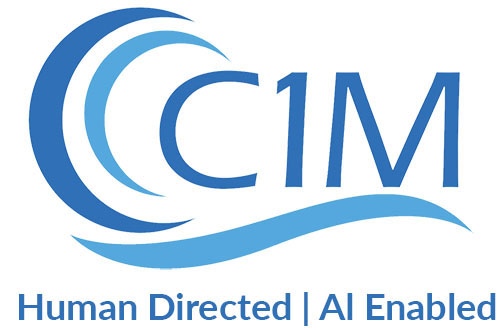
Brand management and creating a strong brand identity is not as simple as it seems. A successful brand identity instantly highlights brand assets and brand values while creating a strong visual identity that potential customers automatically recognize.
Building a brand requires much more than enlisting a graphic designer to create a catchy company logo. While logo design is certainly one of the visual elements in creating a brand identity, crafting a great brand identity begins with an innovative and comprehensive strategy. From your color palette to the core elements of your visual design, you want to ensure your company creates a strong visual identity that makes an emotional connection and helps build a loyal customer base.
An expert in creating a strong brand identity like C1M can help craft your visual identity. Additionally, it can help your company launch a brand identity that resonates and makes a personal connection with your target market. In the meantime, it helps to understand the fundamentals of creating a new brand identity that will leave a lasting impression across the board, from your marketing materials to your social media platforms.
Table of Contents
Examples of Strong Brand Identity
Differences Between Brand Identity and Brand Image
Factors to Consider When Developing a Brand Identity
The Components that Make Up a Brand Identity
Key Considerations and Common Mistakes to Avoid
What is Brand Identity Design?
Brand identity is the color palette, logo, typography, verbiage, and all the visual brand elements that define a company’s core values and character.
When created and launched successfully, a strong brand identity helps communicate a company’s mission and values without excess effort. Therefore, it leaves a memorable impression that instantly creates a link between a visual display and a specific company.
Examples of a Strong Brand Identity
Take time to observe the billboards, advertisements, and online content or other marketing materials that you see on a daily basis. You’ll discover dozens of examples of memorable brand identities. Here are just a few samples of some of the world’s most recognizable brand images and brand identity designs.
- Nike – The Nike Swoosh is a simple logo. However, this straightforward design automatically signifies the Nike brand’s identity as one of the top athletic companies in the world.
- Apple – Like Nike, the Apple brand’s visual identity is simple, but the hallmark Apple logo is instantly recognizable to customers and the public at large.
- McDonald’s – McDonald’s uses a time-tested red and yellow brand color palette as well as the signature “Golden Arches” to create their memorable brand identity. If you have seen any McDonalds billboards or advertisements recently, you’ll notice that the exact name “McDonald’s” is not part of the fast-food brand’s visual identity. However, you’ll know you’re looking at a McDonald’s advertisement all the same due to the unmistakable branding elements.
- Coca-Cola and Pepsi – The two biggest sodas in the world have their own distinctive brand identities that make these almost identical products distinctive Look closely at the brand identity design of a can of Pepsi or a can of Coke, and you’ll notice the different brand fonts, color palettes, and other key elements that set these two companies’ brand identities apart.
Differences Between Brand Identity and Brand Image
Brand identity and brand image are two terms often used simultaneously or in the same conversation. However, there are key differences between these two branding elements.
Your brand identity is the totality of your business’s personality, values, and assets, which are all summed up in a strong brand identity design. However, your brand image is how your target audience sees you. It is the perception or assessment of your company that your target audience makes when they see your brand logo or other noteworthy visual elements.
The main thing to remember is that while you can create a brand strategy and a subsequent brand identity, your brand image is somewhat out of your control. Your target audience essentially determines your brand image for you. However, you can take steps to convey your brand personality, brand voice, and brand messaging to the best of your abilities to have some solid influence on your resulting brand image and how the public perceives your company.
Factors to Consider When Developing a Brand Identity
Before you create a logo, color scheme, and other visual elements that will make up your brand identity (and hopefully a positive and strong brand image), it is helpful to develop a behind-the-scenes strategy of what your brand identity should entail.
Key steps to take before you create a brand identity include the following.
Define Your Brand’s Personality and Your Brand Guidelines
Your brand identity depends on how you want your target audience to perceive your company and your brand experience.
Consider the strengths of your company and the brand assets that are of value to your target audience. These elements of your brand personality should be highlighted and represented in your visual identity.
For example, a luxury company like Jaguar, Rolex, or Gucci wouldn’t use cartoonish typography or a color palette in a rainbow of colors to make a connection with their target audience. Instead, they would stick to visual elements that highlight their brand assets – gold or sleek color schemes, iconic but elegant fonts, and other visual elements that tell a compelling brand story.
Do Your Market Research
Extensive market research is required to create a brand style guide to pave the way for your brand identity’s look and feel. An expert in designing a brand identity like C1M can do the heavy lifting when it comes to brand marketing research. However, research initiatives should consider the following:
Examine Your Brand Identity Heroes
Look at how the top brands in the world use color palettes, logos, and visual elements to make a statement. How did they create a strong brand identity that resonates and instantly highlights their perceived value in the minds of loyal customers? Studying the best can go a long way in creating your own bold brand identity statement.
Examine the Brand Identity of Your Competitors
Looking at the brand identities of your immediate competition serves several purposes. For one thing, it ensures that your brand identity does not get lost in a crowd due to similarities in color palette, brand colors, and other visual elements. For another, it gives you an opportunity to hone your visual branding elements to ensure your own company’s brand stands out and offers something distinctively different, helpful, and better than the competition.
Talk to Your Target Demographic
Once you have a brand style guide or a rough draft of your visual brand identity, it’s time to test it with your target audience. Consider enlisting a focus group or simply asking for feedback through marketing channels, like email campaigns or social media platforms. Market research is crucial in the branding process. Simply put, you need to know that the brand story you are trying to convey effectively hits the market when it comes to how your customers and the public perceive your brand image at large.
The Components that Make Up a Brand Identity
In order to create a brand identity, a company needs to consider a wide range of elements that will eventually combine to create a compelling brand strategy, brand voice, and visual identity. A strong brand strategy that fosters customer loyalty encompasses the following elements (as well as many more.)
Color palette
Your color palette consists of the hues and shades of colors that will be incorporated throughout your marketing materials and other key elements of your business., This includes your social media platforms, website, business cards, and everything in between. Identify and utilize a color scheme that aligns with your brand voice and personality. For example, children’s toy companies like Legos use bold, bright, and cheerful colors, while health food stores like Whole Foods stick to natural greens and browns.
Logo
Your logo is arguably one of the most important aspects of your brand identity, and it should be created with the utmost care and attention to detail. Be distinctive but simple. Your logo shouldn’t contain excessive text and imagery. In addition, it should make your brand stand out and reflect what your company stands for.
Fonts
The fonts you use in your logo, marketing materials, taglines, advertisements, and on your website and social media pages are equally important and should be consistent across the board. Make sure the fonts you use align with your brand identity, and make sure that you steer clear of common and regularly available fonts that are already in use by thousands of companies around the world. Fonts like Futura, Helvetica, Trajan, Gotham, and Calibri are everywhere. As a result, these fonts can be easily ignored by your target audience. A great brand identity includes new and more elusive fonts not commonly found in other brand personalities and images.
Visual display and aesthetic
Your visual display and overall visual aesthetic can be a little more challenging to define, as it includes how the varying visual aspects of your brand identity come together to create a strong brand image. These visual elements include factors like white space (or the amount of space between your logo and other visual aspects), font size, logo size, and other, more subtle branding elements.
For example, look at the overall brand strategy for the famous jeweler Tiffany & Co. Even though the logo and visual elements for this distinctive brand identity are simple – an elegant font with a light blue background – it resonates with customers because of the ample white space that makes the typography and color palette stand out.
Audio logo
Though not applicable to every company or small business, an audio logo is another element to consider when creating a brand identity. Like the visual aspects, your audio logo should be simple but memorable. Consider the static sound preceding every HBO television show or the three tones accompanying the NBC logo. These are simple audio logos, to be sure, but they make an instant connection with these brands’ loyal customers.
Other elements, like mascots, spokespeople, etc.
When creating your brand voice and brand strategy, you may want to incorporate other elements that are outside of the basic visual and design aspects. For example, several companies use a mascot or spokesperson to further foster brand loyalty and to leave an impression. Famous examples include Mickey Mouse, Ronald McDonald, Tony the Tiger, Mr. Clean, and even the Jolly Green Giant. Though these characters don’t have the company name displayed anywhere in their appearance or visual elements, they are instantly connected in customers’ minds with a specific company and brand identity.
Key Considerations and Common Mistakes to Avoid
Creating a brand identity that fosters brand growth and allows your business to stand out in a crowd is a delicate undertaking that requires multiple and interconnecting strategies as part of your overall brand guidelines.
For that reason, there are some key factors that go into creating a great brand identity, as well as some pitfalls to watch out for that can mute your overall brand voice.
Don’t Deviate
Consistency is key when it comes to brand identity. Strong brand identities don’t deviate from the many visual aspects that comprise the core elements of their brand, and changing your logo and colors will only confuse your customers. It will make your brand identity easier to forget. Consider all the brand identities that resonate without saying a word. Companies like Disney and Coca-Cola have been using the same logos, color schemes, and core branding elements for decades, so they remain unforgettable.
Keep it Consistent Across All Channels
From your social media channels to your website, advertisements, and marketing materials, a good brand identity is the same in every medium. You can certainly create new campaigns and play with content and brand messaging, but keep your overall brand identity the same, especially when it comes to visual aspects like colors, fonts, and your logo or other imagery.
Be Original
The key to fostering brand recognition and subsequent brand loyalty is to be distinctive and wholly original. Make sure your brand identity is unique and different from any other company – especially your immediate business competitors.
Show Your Values
Brand loyalty begins with a brand identity highlighting a brand’s assets and perceived value to its customers. Make sure all visual elements of your brand – from your logo to your font choice to your color scheme – convey exactly how you want your target audience to see you. This can help influence how you are perceived and can help create the exact brand image you want your customers to see.
Create Your Brand Identity with an expert at C1M
Creating a brand identity is critical, as it is the foundation of marketing and business strategy.
Your brand identity should be consistent and solid without deviation. Therefore, it’s essential to create a brand identity that is eye-catching and authoritative right from the start.
This is where C1M can help make the brand identity process easier.
From market research to graphic design, C1M has limitless resources when it comes to identifying all the make-or-break factors that go into creating a brand identity that resonates and leads to a powerful brand image. Reach out to our brand identity specialists today. We’ll work together to ensure your business leaves a lasting and unforgettable impression.







